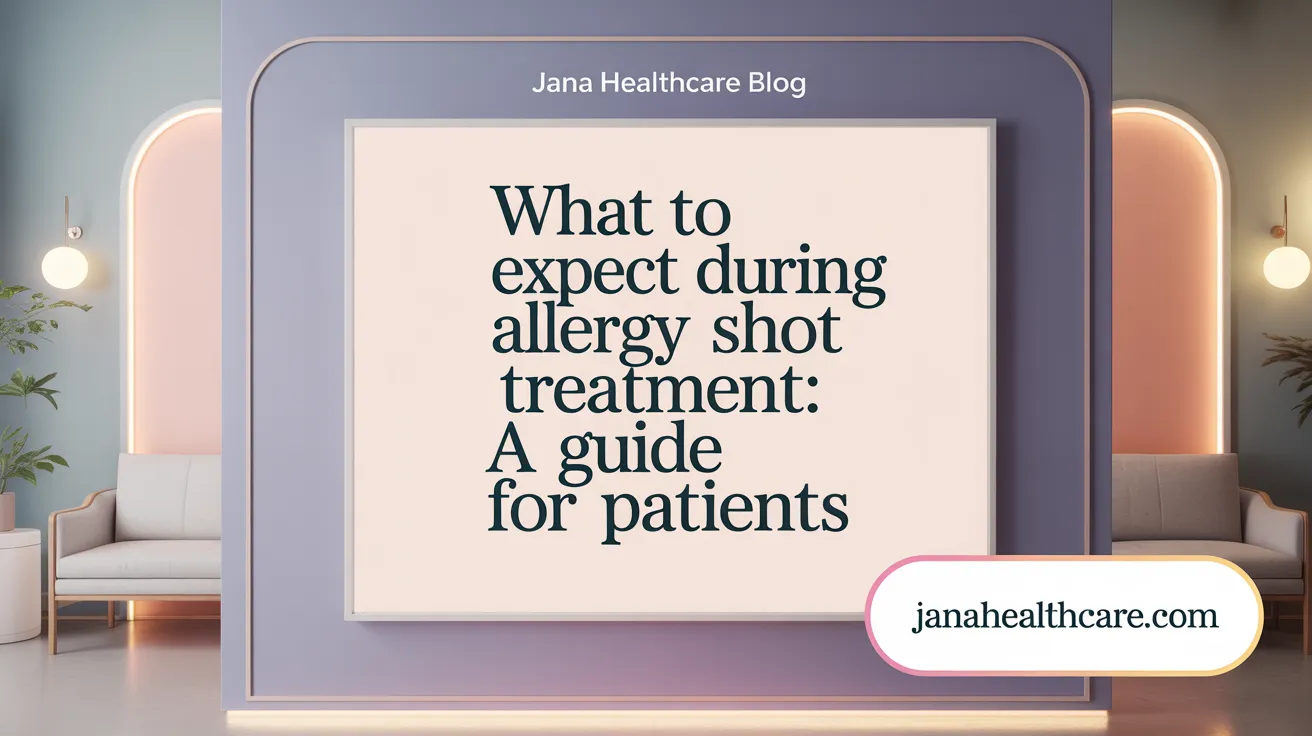A New Hope for Allergy Sufferers
Every year, millions struggle through sneezing fits, congestion, itchy eyes, and watery noses brought on by seasonal allergies. While antihistamines and nasal sprays offer quick relief, they often address only the symptoms, not the root cause. Allergy shots, a proven form of immunotherapy, promise a long-term solution by retraining the immune system. This article explores how allergy shots could finally bring an end to your sneezing season for good, detailing their mechanism, effectiveness, safety, and what to expect from treatment.
Understanding Allergy Shots: How Do They Work?

How do allergy shots work to reduce allergy symptoms?
Allergy shots, also known as immunotherapy for allergies, work by gradually exposing the immune system to small, controlled amounts of allergens. This controlled exposure helps retrain the immune system, shifting it from an overactive inflammatory response to a more tolerant state. By building tolerance, the body's hypersensitivity to allergens such as pollen, dust mites, pet dander, mold, and insect venom is significantly reduced. This process helps decrease allergy symptom reduction and can provide long-lasting relief.
What allergens are allergy shots typically used for?
Allergy shots are effective against a range of airborne allergens treated by allergy shots, including tree, grass, and weed pollens, dust mites, molds, and pet dander. They are also used for allergies to insect stings from bees, wasps, and yellowjackets. However, allergy shots are not suitable for food allergies, medication allergies, or latex allergies.
What is the treatment schedule for allergy shots?
The treatment consists of two main phases:
-
Build-up phase: Lasts about 3 to 6 months with injections given once to three times weekly. During this period, the allergen dose is gradually increased to build tolerance.
-
Maintenance phase: After reaching the effective dose, injections are given every 2 to 4 weeks over 3 to 5 years or longer depending on individual response and allergy severity.
This schedule ensures a steady increase of allergen tolerance while monitoring for any side effects. For more details on allergy shot treatment phases, see available guidelines.
Immune system desensitization through allergy shots
By repeatedly introducing increasing doses of the allergen, allergy shots help the immune system produce protective antibodies (such as IgG) that block allergic reactions, reducing the release of histamine and other chemicals responsible for symptoms. This gradual desensitization can also prevent the development of new allergies and reduce the risk of allergic asthma progression. Learn more about how allergy shots work and the long-term allergy shot benefits.
Comparison with symptom relief medications
Unlike antihistamines for allergies and nasal sprays that provide quick but temporary relief by blocking histamine or reducing inflammation, allergy shots address the root cause by modifying the immune response. While antihistamines relieve symptoms quickly, they don’t change the underlying allergy. Allergy shots require a long-term commitment but can reduce or eliminate the need for daily medications by offering lasting symptom improvement. See comparison of allergy shots and antihistamines.
Allergy shots can be an effective therapy for those with moderate to severe allergies or for patients seeking a long-term solution beyond symptom management. For comprehensive insights on immunotherapy for allergies, consult allergy specialists.
Effectiveness and Long-Term Benefits of Allergy Shots

How effective are allergy shots in providing relief?
Allergy shots are highly effective for many sufferers, with approximately 80-85% of patients experiencing significant symptom improvement after completing the full course of treatment. Relief often begins within six to eight months of starting immunotherapy for allergies, with the most noticeable benefits appearing within the first year. This slow onset is due to the gradual buildup phase of allergy shots where small, controlled doses of allergens train the immune system to decrease its overreaction.
Do allergy shots provide long-term relief after treatment ends?
Yes, allergy shots can provide lasting benefits beyond the treatment period. Around 60% of patients maintain symptom relief for 3 to 5 years after finishing their immunotherapy. Studies also show allergy shots might prevent the emergence of new allergies and reduce the risk of allergic rhinitis progressing into asthma, particularly in children.
Symptom reduction timeline
- Build-up phase (3-6 months): Weekly to bi-weekly injections gradually increase allergen dosage.
- Maintenance phase (3-5 years): Monthly injections help sustain immune tolerance.
- Symptom improvement: Usually begins 6-8 months into treatment, with optimal results within 12 months. See more about the symptom relief timeline for allergy shots.
Success rate statistics
| Statistic | Percentage | Notes |
|---|---|---|
| Patients with significant relief | 80-85% | After completing full treatment course (source) |
| Patients with lasting benefits | 60% | Benefits last 3-5 years post-treatment (source) |
Comparison with antihistamines
While antihistamines provide quick, short-term symptom relief that blocks histamine effects, they do not change the underlying allergy sensitivity. Allergy shots, although requiring a long-term commitment, address the root cause by retraining the immune system and can reduce or eliminate symptoms over time.
Potential prevention of new allergies and asthma
Immunotherapy has shown promise in preventing the development of new allergies and may inhibit the progression from allergic rhinitis to asthma, improving overall long-term respiratory health especially in pediatric patients.
Safety, Side Effects, and Patient Suitability

Are allergy shots safe, and what side effects can occur?
Allergy shots are generally considered safe for most patients. Common side effects include mild reactions such as redness, swelling, and itching at the injection site. Some patients may also experience systemic symptoms like sneezing, nasal congestion, or hives, though these are less frequent. Rarely, severe allergic reactions including anaphylaxis can occur, which is why patients are monitored for at least 30 minutes after each injection to promptly manage any serious response (Side Effects of Allergy Shots, Allergy Shots and Immunotherapy).
Who is a suitable candidate for allergy shots?
Allergy shots are typically recommended for adults and children aged five years or older who have significant allergies not well controlled by medications. They are effective for environmental allergens such as pollen, dust mites, pet dander, and insect stings. However, allergy shots are not advised for individuals with uncontrolled asthma, certain heart conditions, or those taking medications like beta-blockers or ACE inhibitors. Pregnant women are generally advised against starting treatment during pregnancy (Allergy Shots Eligibility and Contraindications, Who Should Avoid Allergy Shots.
How does insurance coverage affect the cost?
The cost of allergy shots can vary widely, ranging from about $1,000 to $4,000 annually based on the healthcare provider and insurance coverage. Most insurance plans do cover allergy immunotherapy, which often makes allergy shots a cost-effective option in the long term compared to ongoing symptomatic medication expenses. Patients should verify their insurance benefits for detailed coverage information (Cost of Allergy Shots, Insurance Coverage for Allergy Shots).
Precautionary measures
Patients receiving allergy shots are advised to avoid strenuous exercise or hot baths for at least two hours post-injection to reduce the risk of allergen spread and reactions. Additionally, carrying an epinephrine auto-injector may be recommended in case of severe reactions outside the clinic. Continuous communication with healthcare providers about any changes in health status or medications is essential for safe treatment (Allergy Shot Safety Precautions, Post-injection Precautions.
Contraindications and monitoring
Before starting allergy shots, thorough allergy testing is performed to ensure the treatment targets relevant allergens. Individuals with unstable asthma, autoimmune diseases, or on certain medications may be contraindicated. Treatment is administered only under medical supervision in facilities equipped to handle emergencies. Regular follow-up appointments are necessary to adjust doses and monitor treatment effectiveness and safety (Allergy Testing and Candidate Selection, Monitoring and Follow-up for Allergy Shots).
Allergy Shots vs. Conventional Allergy Medications

How do allergy shots compare to antihistamines and nasal sprays?
Antihistamines and nasal sprays offer rapid relief from allergy symptoms by blocking histamine release or reducing inflammation. However, they primarily treat symptoms without addressing the underlying immune reaction that causes allergies. In contrast, allergy shots work by gradually desensitizing the immune system to specific allergens. This immunotherapy builds tolerance over time, aiming for long-lasting symptom reduction and potentially lasting remission, even after treatment ends.
What are the differences in treatment goals?
Conventional medications focus on immediate symptom relief to help patients cope with allergic reactions in the short term. Allergy shots target the root cause by retraining the immune system, reducing sensitivity to allergens. The goal is to provide sustained relief and reduce future allergic responses, ultimately improving long-term quality of life.
How soon do symptoms improve with each treatment?
Medications like antihistamines provide quick symptom control, usually within hours. Allergy shots require a longer commitment; symptom improvements typically begin after six to eight months, with full benefits often seen after one year or more of regular treatment.
Can allergy shots reduce medication dependency?
Yes, many patients find they can decrease or even eliminate their use of daily antihistamines and nasal corticosteroids after successful immunotherapy. This helps reduce medication side effects and long-term costs.
Is there value in combining allergy shots with medications?
Combining allergy shots with conventional medications is common and beneficial. Medications can control symptoms during the initial months of immunotherapy when tolerance is still developing. This combined approach helps patients manage severe allergies more effectively and maintain symptom relief throughout treatment. For more details, see combination allergy treatments.
What to Expect During Allergy Shot Treatment

Initial evaluations and allergy testing
Before starting allergy shots, patients undergo thorough evaluations including skin prick tests or blood IgE tests. These pinpoint specific allergens responsible for symptoms and allow doctors to tailor allergy shots precisely for effective immunotherapy for allergies.
Treatment duration and appointments
Allergy shot treatment duration is a long-term commitment typically spanning 3 to 5 years. Initially, patients attend weekly or biweekly visits during the build-up phase, where allergen doses are gradually increased. After reaching an effective dose, maintenance injections are given monthly. Staying consistent with this schedule is crucial to achieve lasting benefits.
Lifestyle considerations
During treatment, patients should avoid vigorous exercise or hot baths within two hours after injections, as these activities can increase the risk of allergen spread and side effects. Staying alert to symptoms and promptly reporting any unusual reactions ensures safe progress through therapy. Post-injection precautions are important for allergy shots safety.
Monitoring and managing side effects
Most side effects are mild, such as localized redness or itching at the injection site. Rare but serious reactions like anaphylaxis risk require immediate medical attention, making supervised administration and post-injection observation a standard part of treatment.
Long-term outcomes and follow-up
After completing the full course, many patients enjoy lasting relief from allergy symptoms, including reduced severity and less medication dependence. Additionally, allergy shots can improve asthma control and may prevent the development of new allergies. Benefits often persist for years, allowing individuals to better manage allergy seasons with improved quality of life.
A Future Free from Sneezing and Itchy Eyes
For millions suffering from seasonal allergies that disrupt daily life, allergy shots offer a scientifically backed solution that goes beyond temporary symptom relief. By addressing the root cause of allergic reactions and retraining the immune system, allergy shots can provide long-lasting relief that endures beyond the treatment period. While requiring a commitment of time and medical supervision, the benefits—ranging from improved quality of life to reduced medication dependence and prevention of asthma—make allergy shots a compelling option for those seeking to finally end their sneezing season for good.
